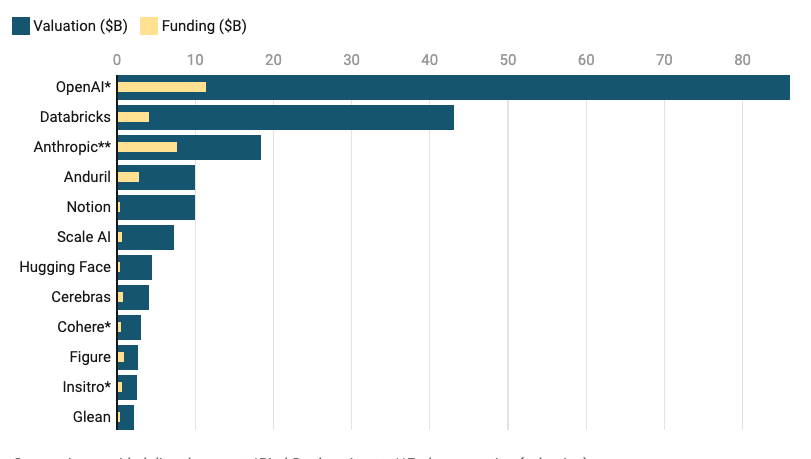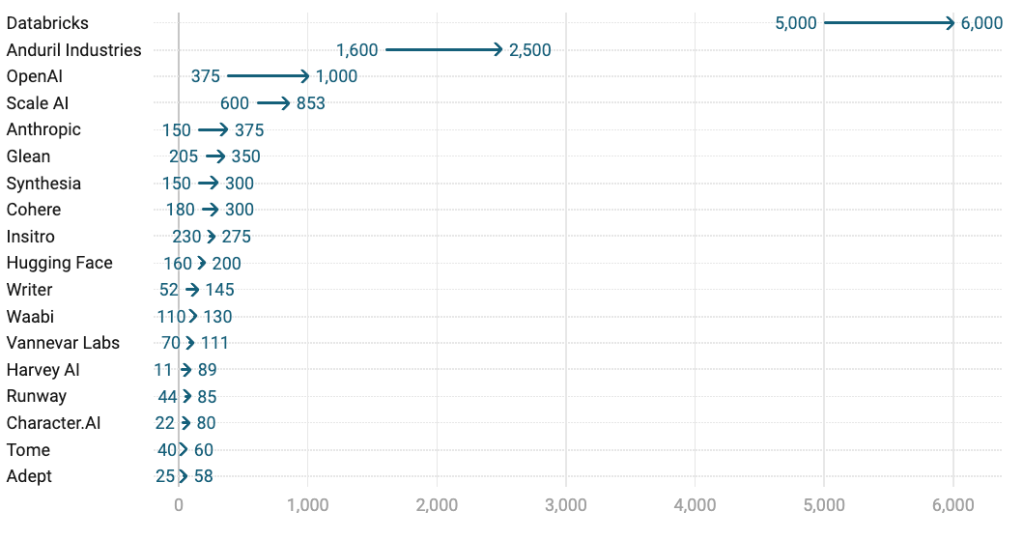This year’s AI 50 list shows that artificial intelligence is helping companies achieve more with less: the median headcount for an AI 50 startup was 89 employees, down from 150 last year.

Last year, OpenAI chief Sam Altman predicted that the artificial intelligence revolution will someday birth a company with a $1 billion valuation and a single employee. The companies on Forbes’ sixth annual AI 50 show that while there’s a long way to go to reach that prediction, the sector’s most promising startups are trending in that direction.
Only three companies on the list have at 1,000 employees or more: defense tech provider Anduril Industries, data analytics firm Databricks and AI model developer OpenAI. This year’s list is dominated by new entrants with smaller headcounts: 28 of the companies are making their AI 50 debut, part of a nascent new economy developing around the AI boom.
Roughly a third of the newcomers enjoyed massive business traction over the past year selling the infrastructure needed for AI applications, as in the case of Pinecone’s database software that has valued it at $750 million, LangChain’s AI app builder ($200 million) and AssemblyAI’s speech recognition plug-ins ($300 million).
Most of the other first-timers demonstrated early promise applying AI to real-world use cases. Take Abridge, which is developing AI medical scribes, a business worth $850 million so far; Sierra’s customer service chatbots, also reportedly worth close to $1 billion; or Notion, last valued at $10 billion, which sprinted to implement the latest advances in generative AI into its own productivity suite.
AI 50: The Top Artificial Intelligence Startups
“In the years to come, just like in the ‘digital transformation’ where every company became a digital company, we see a future where every company becomes more of an AI company,” said Konstantine Buhler, a partner at Sequoia Capital who works with Forbes on the AI 50 as a data partner.
Taken together, this year’s AI 50 honorees demonstrate that as venture dollars flock into AI, the best companies are able to raise vast sums of money at a leaner scale and younger age than before.
Intelligent Unicorns
THE HIGHEST VALUED COMPANIES ON THE 2024 AI 50

While startups in other sectors like cryptocurrency and fintech are in the middle of trying to recover from a market pullback, AI is booming. Of the 47 companies on AI 50 which disclosed their valuation or had a known valuation through data provider PitchBook, two dozen are valued at $1 billion or more. The three most valuable companies — OpenAI ($86 billion), Databricks ($43 billion) and Anthropic ($18.4 billion, as Forbes reported) — were all awarded a step up in price over the past 12 months.
The sky-high valuations of humanoid robot maker Figure AI ($2.6 billion) and AI data hub Hugging Face ($4.5 billion) further show that growth stage AI companies seem to have no trouble raising capital, despite the market drying up for other sectors.
That comes in part because the top AI startups are attracting investment from beyond traditional later-stage venture funds. Jeff Bezos was among Figure’s new investors in March 2024, and Hugging Face raised from Amazon, Google, Nvidia and other industry bigwigs last August. Microsoft has backed model companies OpenAI and Mistral, while Amazon and Google have invested in Anthropic. In total, the companies on the 2024 AI 50 raised $34.7 billion, up from $27.2 billion on last year’s list.
AI 50 RETURNEE HEADCOUNTS, 2023 VS. 2024

But while AI 50’s early-stage newcomers are on average raising more money than before, they are also doing it with fewer employees. We’re not talking about layoffs: the most promising newcomers are achieving more with fewer workers. Despite every returnee from the 2023 list reporting an uptick in employees, the overall mean headcount decreased by 3% to 347 people from 357. The median decreased by 41% to 89 people from 150.
Even the AI 50’s largest companies by headcount are many times smaller — and more nimbler — than the incumbents. OpenAI, which is directly competing with Google, has less than 1% of the search behemoth’s employee base. “That’s a sterling example of how in the AI race you can actually win as a startup, even beat or challenge an incumbent,” Buhler said.
European Renaissance
Among this year’s debut standouts is Mistral AI, a year-old startup which soared to a $2 billion valuation, per PitchBook, with its play to build a European rival to OpenAI. Named for a wind which blows from the French Alps into the Mediterranean that portends good weather, the Paris-based startups’ founders hail from AI research labs at Google and Meta. Mistral is just one of eight companies on the AI 50 that are headquartered in Europe, up from two in 2023, the first year that Forbes expanded eligibility for the AI 50 from North America to the rest of the world.
Europe’s top AI startups hail from across the continent. Mistral’s French compatriot Photoroom is developing an image editor; Dutch outfit Cradle is working on discovering complex proteins that could form the basis of future medicines; and London-based ElevenLabs has built a billion-dollar company out of its voice cloning software. And it’s no coincidence. Google-owned AI lab DeepMind is based in London and alumni from it and Google’s other operations on the continent are behind the establishment of startups like Cradle, ElevenLabs and Mistral. Aidan Gomez, cofounder and CEO of Cohere (valued at $3 billion, per PitchBook) and another former Googler, recently set up a second residence in London after first setting up a company office there in 2022.
Buhler told Forbes that Sequoia had conducted a study, unrelated to AI 50, which found that Europe’s per capita concentration of AI experts is 30% higher than the United States. Especially big hubs can be found in London, Paris and Zurich, he said: “The number of promising AI companies in Europe is on the rise.”
This article was first published on forbes.com


